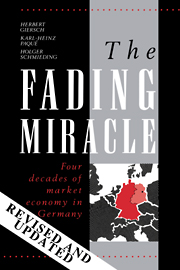Book contents
1 - Stylized facts 1948–1990
Published online by Cambridge University Press: 09 February 2010
Summary
On 18 October 1952, a British weekly published a survey on the performance of the West German economy since the Second World War. Its general message was plain: unconditional acknowledgement of a wholly unexpected economic recovery, the so-called German miracle, and warm praise for the sound economic policies that had brought it about. On 15 October 1966, the same paper carried another survey of this type called ‘The German Lesson’, in which the acknowledgement and praise of fourteen years earlier had become a quite enthusiastic – although not uncritical – celebration of the virtues of an export-orientated economy German style, with its excellent industrial relations and its reasonable macroeconomic policies. For all occasional caveats, West Germany appeared as a shining counter-model to the Britain of the day, with its economy inflicted by sclerotic diseases and maltreated by macroeconomic stop-and-go shocks. On 7 May 1988, about six weeks before the fortieth anniversary of the West German currency reform, the same paper published a leading article on the state of the West German economy. Under the highly suggestive headline ‘Wunderkind at 40’ and below a front cover showing a fat middle-aged man, unmistakably German in appearance, the article conveyed the picture of a rich, saturated and stodgy economy with not much zeal for growth and not enough flexibility for structural change left over from the days of its youth; the prospects for the future were painted in somewhat gloomy colours, and there was no talk any more of an enviable German model.
- Type
- Chapter
- Information
- The Fading MiracleFour Decades of Market Economy in Germany, pp. 1 - 15Publisher: Cambridge University PressPrint publication year: 1992

